Mekong News - Archive
July - September 2006
Issue 2006/3
In this issue:
- Members sign water flow procedures
- JC suppots Strategic Plan 2006-2010
- MRC takes plan to stakeholders
- Navigational aids will boost trad, aid safety
- France extends more aid to Mekong-HYCOS
- Finland backs development of knowledge management programme
- Donors support MRC strategy
- Early warning systems the key to flood awareness
- Worksop kicks off irrigation project
- Research under discussion
- Upcoming evnets
Members sign water flow procedures
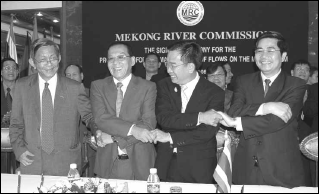
The four MRC Council Members share
the Mekong Spirit
after the signing ceremony.
Senior government ministers representing the four Mekong River Commission (MRC) member countries signed an important agreement on the procedures governing the maintenance of flows on the Mekong mainstream on 22 June 2006. The Ministers, who are also members of the MRC Council endorsed the Procedures for the Maintenance of Flows on the Mainstream at a signing ceremony held in Ho Chi Minh City, Viet Nam.
In attendance were H.E. Mr. Lim Kean Hor, Minister of Water Resources and Meteorology, Cambodia; H.E. Mr. Somphong Mongkhonvilay, Minister to the Prime Minister’s Office, Lao PDR; H.E. Mr. Yongyut Tiyapairat, Minister of Natural Resources and Environment, Thailand (and Chairman of the MRC Council 2005/2006); H.E. Dr. Cao Duc Phat, Minister of Agriculture and Rural Development, Viet Nam; members of the MRC Joint Committee and the four National Mekong Committees (NMCs); representatives from the Thai and Cambodian consulates; MRC Secretariat Chief Executive Officer Dr Olivier Cogels and MRCS staff.
The MRC’s Water Utilisation Programme is working with the four member countries to help them develop and formulate a range of water procedures with support from the Global Environment Facility through the World Bank.
The flow procedures are required under the provisions of the 1995 Mekong Agreement which require the MRC member states to cooperate in the maintenance of:
- Acceptable minimum monthly flows in the dry season
- Acceptable natural reverse flow of the Tonle Sap during the wet season
- Prevention of peak flows greater than occur naturally.
The Procedures for Maintenance of Flows on the Mainstream clarify the related provisions of the Mekong Agreement through further defining objectives, principles and scope of their application as well as the roles and responsibilities of the various parties required for their implementation, including the MRC Council, the MRC Joint Committee, the NMCs and the MRC.
Most notably the Procedures delegate the responsibility to prepare Technical Guidelines for their implementation to the members of the Joint Committee.
These Technical Guidelines will define in concrete terms the actual flow and level values and the location of the Mekong mainstream hydrological stations which will be used to monitor these flows and levels.
The MRC is now undertaking work analysing flow regime changes.
JC supports Strategic Plan 2006-2010

The four Joint Committee members sign
the Water Monitoring Guidelines.
The 23rd meeting of the Joint Committee held in Savannakhet, Lao PDR on 4-5 April witnessed the signing of the Guidelines on Implementation of the Procedures for Water Use Monitoring, which would enable member countries to facilitate the implementation of two important previously signed procedures concerning water use monitoring and data and information sharing.
JC members also approved the process to be followed for the finalisation of the MRC Strategic Plan 2006 – 2010. This is an important step toward the final adoption of the Strategic Plan. This plan has been developed by the member states, and in consultation with the donor community and reflects their views, demonstrating a strong shared vision of the need for a regional perspective in development.
Final discussions with the JC members took place at an Informal Joint Committee Meeting held in Vientiane on 22-23 May 2006 where they approved the improved version of the Strategic Plan, which includes additional suggestions from member countries and donors.
The 23rd Joint Committee meeting also heard that over the past year MRC’s relationship with China and Myanmar had strengthened. MRC was now poised to move toward more concrete technical cooperation within its established dialogue partnership and was in the process of discussing and identifying a number of possible work areas.
MRC Secretariat Chief Executive Officer Dr Olivier Cogels told delegates that the MRC’s financial situation was sound and stable.
The donor community had continued to show strong support for the work of the MRC over the six months to April 2006 new funding agreements worth more than US$8.3 million had been signed with Australia, Belgium, the Challenge Programme on Water and Food, Denmark, Finland, France, Japan, Sweden and the United States of America. The Belgian funding had enabled the launching of the Navigation Programme, while Denmark had provided the bulk of funding needed to support the Fisheries Programme for a further three years.
Dr Cogels said the MRC had also strengthened its partnerships with development banks in the region, such as the World Bank, the Asian Development Bank, French Development Bank AFD and KfW German Development Bank.
MRC had also formed a new relationship with the Japan Bank for International Cooperation and been heavily involved in the World Bank’s Mekong Water Resources Assistance Partnership Programme, which was developed in close consultation with the country governments, the MRC and civil society and using MRC data and expertise.
Dr Cogels said there was a consensus that the MRC’s role was to take leadership in strategic planning and management of the basin’s water and related resources and to identify joint and basinwide projects and programmes, while supporting line agencies w
MRC takes plan to stakeholders
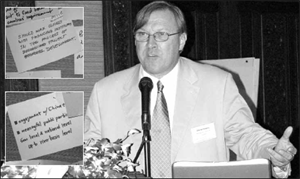
Dr Cogels explains the work of the
MRC and its
strategic goals to dialogue participants, who noted their
suggestions on cards which were pinned to the walls
after the session.
Representatives from the Mekong River Commission were delighted to have the chance to play an active role in a recent regional stakeholder forum entitled the Mekong Region Waters Dialogue - Water Futures Together, held in Vientiane, Lao PDR.
The aim of the dialogue meeting was to provide a platform for participants to learn, share and discuss different perspectives regarding decision-making for water development and management in the Mekong Region. The MRC welcomed this opportunity to both inform stakeholders in the Mekong Basin about its work and seek their opinions, through active discussion, on how it could improve this work.
The dialogue, which was organised by the IUCN, the Thailand Environment Institute, the International Water Management Institute (IWMI) and the Mekong Programme on Water and Resilience (M-Power), was the first of its kind in the region to bring together representatives from governments, international organisations, development banks, civil society, NGOs, private business and other interested actors from the six Mekong countries. More than 140 people attended the forum.
MRC Secretariat CEO Dr Olivier Cogels made a presentation on the MRC's regional strategy for use and development of the water resources within the Mekong River Basin to all participants, as did the World Bank and the Asian Development Bank.
These presentations were followed by facilitated round table discussions where tables of 10 participants had the chance to make their opinions heard and discuss the issues raised by the presenters. These discussions spurred many useful and constructive comments about the structure, work and involvement of the MRC.
On the second day of the dialogue the MRC made a presentation. and particpated in the E-flows/integrated basin flow management session. The MRC also hosted its own session focusing on the MRC Strategic Plan 2006-2010. This session produced extensive feedback to this plan prior to it being tabled for adoption at the next MRC Joint Committee meeting in August 2006.
The session included representatives from all sectors and countries and they took this opportunity to ask questions and engage in discussions relating to the Strategic Plan. The MRC requested that all those interested submit their comments in writing for consideration of inclusion in the Strategic Plan.
This is the second time the MRC has sought to involve stakeholders in its decision-making process for the sustainable development of the Mekong River Basin in the context of its strategic planning process. The first meeting was held in August 2005 and more are planned.
Navigational aids will boost trade, aid safety
The Mekong River has always been the people's highway. A vital artery linking six countries, it has been used as a prime source of transport since people first settled in the Mekong River Basin. But the real potential of commercial shipping has rarely been used.
Although the research and statistical figures clearly show that moving goods and people along the waterways is more economical and more environmentally friendly, it has taken a while to gain the confidence of politicians, planners and investors.
There have always been risks with navigating the river and today, with larger, more powerful, craft plying the river, the risks are even greater. Natural hazards like rocks and rapids can only be negotiated by those familiar with the river. In some regions only a handful of skilled skippers have intimate knowledge of such hazards and even the most experienced sailors do not travel at night.
The result is that the economic potential of the river is being seriously under-exploited. Cargo which could be cheaply and safely transported from the southern provinces of China through Chiang Saen in Thailand to Luang Prabang in Lao PDR is grounded.
In Cambodia exporters who could save money and ship more goods (particularly garments from the flourishing garment industry) from Phnom Penh to the deep sea ports in Viet Nam, or directly to mother ports such as Hong Kong and Singapore, are halted in their tracks by only being able to sail during the day.

This hypothetical chart shows how
buoys and beacons can help skippers navigate safely.
One of the initial aims of the the Mekong River Commission's Navigation Programme (NAP) is to increase the efficiency of domestic and cross-border waterborne transport in the LMB, while reducing the incidence of accidents and minimising risks of environmental disasters through spillages on the waterways.
It will do this by improving the navigation conditions on the Mekong River in the Delta between Phnom Penh, Cambodia and the Vam Nao Pass, Viet Nam by the installation of aids to navigation which will facilitate river traffic for inland barges between Cambodia and Viet Nam and for seagoing vessels between overseas ports and Cambodia and Viet Nam.
The Navigation Programme has now completed the detailed design for the aids to navigation system with maps and locations for the aids.
These navigational aids will work for 24 hours a day. The installation of a navigational system which allows boats to operate at night (thus increasing sailing time by 11 hours) would rapidly increase the trade from Cambodia. Previous experiences have shown that installing proper navigational aids can boost traffic by 35%. This increased trade will help the country meet its goals of alleviating poverty.
With the provision of adequate aids to navigation, there is no need to fully dredge the waterways, but simply to beacon and buoy the deepest parts of the river as a guide to vessels.
The MRC is also considering improving the navigation conditions on the Upper Mekong River in the Lao PDR and Thailand between Luang Prabang and Vientiane by possible installation of aids to navigation which would facilitate river traffic in Lao PDR, and between Lao PDR and Thailand.
The NAP is partially funded by the Belgian Government's Federal Public Service Foreign Affairs Directorate- General for Development Cooperation.
France extends more aid to Mekong-HYCOS
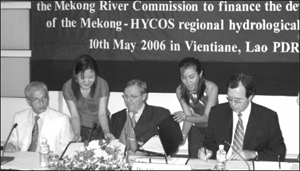
From left: H.E. Mr Maurice Portiche,
Dr Olivier Cogels
and Mr Etienne Woitellier.
On May 10, 2006 the Agence Française de Développement (AFD, the French Development Agency) signed an agreement with the Mekong River Commission (MRC) for a 2.5 million Euro grant to support the development of the Mekong-HYCOS – a regional hydrological cycle observing system. The grant represents 1.5 million Euro from the AFD and one million Euro from the French Global Environment Fund (FFEM). The AFD manages both grants.
The MRC’s Chief Executive Officer Dr Olivier Cogels signed the agreement with Mr Etienne Woitellier, Director of the AFD in Vientiane, in the presence of H. E. Maurice Portiche, Ambassador of France to the Lao PDR.
This is the second agreement the MRC has signed this year with AFD and complements the first agreement (for 800,000 Euro) signed in January 2006, bringing the amount of French support to 3.3 million Euros.
The Mekong HYCOS project aims at establishing a reliable and well functioning regional hydrological observation system covering the mainstream and main tributaries of the Mekong River shared by the four member states of Cambodia, Lao PDR, Thailand and Viet Nam.
The project is part of the Information and Knowledge Management Programme of the MRC, aiming at providing up-to-date and objective data, information and decision support tools to basin’s stakeholders. It will be developed in partnership with the World Meteorology Organisation.
A representative of the Australian Government’s development arm AusAID also attended the ceremony as AusAID has been deeply involved with the MRC’s river monitoring work through its support of the Appropriate Hydrological Network Improvement (AHNIP) project.
AHNIP has put in place a regional hydrological system providing near real time data for more than 10 stations in the Mekong Basin. HYCOS will build on and integrate this system.
Finland backs deveIopment of knowledge management programme
The Ministry for Foreign Affairs of Finland has signed an agreement to provide 171,991 Euro (around US$216,600) to fund the formulation of the MRC Information and Knowledge Management Programme.
The agreement was signed on 26 April 2006 by H.E. Lars Backström, Ambassador, Embassy of Finland in Bangkok and Dr Olivier Cogels, CEO of the MRCS.
The programme formulation is already well under way with the production of an initial report which has drawn together all the relevant data and methodology available in order to ascertain the general structure and framework that should be contained in an IKM programme.
This report will be followed by the organisation submitting tenders for consultants to come on site for several months in order to transform this framework into a programme document which will establish the IKMP to a point where funding can be sought for its full operation.
Australia will assist development and implementation of the IKMP and preliminary work on the programme is being undertaken under the AHNIP extension funding.
Donors support MRC strategy
The MRC held its annual Informal Donor’s Meeting in Vientiane on 5 July to discuss the MRC’s Strategic Plan for 2006-2010 and share with our donors plans for future programme work and financial issues.
At this meeting the donor group, which comprised representation from 10 countries, the World Bank, the Asian Development Bank, the EU and the UNDP, accepted and showed strong support for the latest draft of the MRC’s new Strategic Plan, giving a very positive sign for increased funding for the MRC over the coming years.They said that the Strategic Plan provided a good basis for future work and they were pleased to see more emphasis on the MRC as a knowledge- based river basin organisation promoting sustainable development.
The MRC sought input from many sources for the Strategic Plan and now has a very good understanding with all parties over this countrydriven plan and the leading role MRC can play in future sustainable development of the basin.
Early warning systems the key to flood awareness
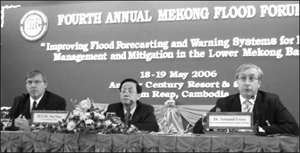
Dr Cogels, H.E. Mr Sin Niny and Dutch
First Secretary
Dr Armand Evers gave opening addresses.
Representatives of the Mekong River Commission (MRC) and stakeholders working with floods met together to discuss the improvement of flood forecasting and early warning systems at the 4th Annual Mekong Flood Forum, held on 18-19 May in Siem Reap, Cambodia.
The theme of this year's forum was "Improving Flood Forecasting and Warning Systems for Flood Management and Mitigation in the Lower Mekong Basin" and it aimed to raise the awareness of the current state of flood forecasting and warning systems at the national and regional levels in the Lower Mekong Basin.
The forum also provided an opportunity for participants to discuss the emerging needs within the basin and to review the progress each country has made towards a holistic and balanced flood management plan.
More than 100 participants from the four MRC member countries and their line agencies, from Dialogue Partners China and Myanmar, regional and international scientists and experts,academics, international and national civil society organisations and local communities attended the forum. They gathered to discuss the current status of flood forecasting and warning systems in the Lower Mekong Basin, and to exchange experiences, best practices and ideas on managing and mitigating floods in the region.
Topics of presentations included flood preparedness and early warning systems projects being conducted at a community level; the potential for technology to improve flood forecasting and the status of flood forecasting and warning in China, Myanmar and in the MRC.
Efficient flood management and mitigation is an important precondition for poverty alleviation and sustainable development in the Mekong region and the MRC recognises the need to create a highly efficient flood forecasting system, which must also include the ability to cope with flash floods and which will provide accurate, timely and easily understood data to all those people likely to be affected by floods.
In his welcome address, MRC Secretariat CEO Dr Olivier Cogels underscored the lack of sophisticated flood forecasting and warning systems in the Mekong River Basin and emphasised the urgent need to improve the quality of flood information.
H.E Mr Sin Niny, Vice Chairman of the Cambodia National Mekong Committee, told the forum delegates that significant damage reduction could only be achieved if a whole range of necessary flood forecasting and warning activities was implemented and well coordinated. This required the compilation of a high-quality database with high quality data, competent and qualified human resources, state-of-the-art support tools and models and suitable communication technologies for warning dissemination.
The Forum was organised by MRC's Regional Flood Management and Mitigation Centre in Phnom Penh and supported by the Royal Netherlands Government.
Workshop kicks off irrigation project
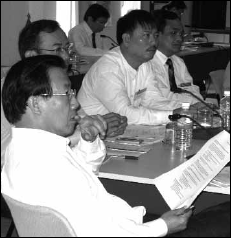
Participants discuss project objectives.
The Agriculture Irrigation and Forestry Programme held its inaugural regional workshop on the Improvement of Irrigation Efficiency in Paddy Fields (IIEPF) project at the MRC Secretariat on 3-4 May 2006.
The workshop kicked off the project which has been under preparation since last year and aimed to finalise the project document and discuss the outline of the forthcoming project activities.
The project is being run in collaboration with the United Nations Food and Agriculture Organisation (FAO) and is being supported by the Government of Japan.
Around 30 participants from the four member countries had active discussion on the project concept and revised project document, were introduced to a unique irrigation scheme appraisal tool introduced by the FAO (the Rapid Appraisal Process), details of fieldwork under the project, proposed pilot project sites and details of future RAP training workshops.
Mr Thierry Facon from the FAO attended as did Mr Nakamura Ken, second secretary, Embassy of Japan.
Participants made slight amendments to the project document, prior to its acceptance. The project will now commence activities such as the RAP training workshop (held in mid-July) fieldwork and further preparation.
Participants also had the opportunity to visit Nam Houm project, just outside Vientiane, to see how water management and irrigation schemes work in Lao PDR.
Research under discussion
The Mekong River Commission is joining forces with five Japanese Mekong Research Groups to present an International Conference on Mekong Research in Chiang Rai, Thailand on 18-21 October.
The aim of the four-day conference is to unite the many Mekong research groups working around the world so they can discuss their common agenda from different perspectives, focusing on the people of the Mekong Basin. The Japanese groups say they hope this will help clarify what has been tried and what has been achieved, in order to avoid an overlap of efforts, as well as giving participants the chance to discuss future Mekong research.
Upcoming events
2006 World Water Week in Stockholm
20-26 August 2006. Stockholm, Sweden
www.worldwaterweek.org
E-mail: sympos@siwi.org
24th Joint Committee Meeting and 11th
Dialogue Meeting
28th -31st August, Vientiane, Lao PDR
schiefer@mrcmekong.org
9th International Riversymposium
Managing Climate change and Expanding Populations
4-7 September, 2006, Brisbane, Australia
www.riversymposium.com.au
E-mail: emily@riverfestival.com.au
10th International Conference on Wetland
Systems for Water Pollution Control
23-29 September 2006, Lisbon, Portugal
Organiser: International Water Association (IWA)
http://www.unesco.org/water/water_events/Detailed/1202.shtml
3rd International Symposium on Integrated
Water Resources
Management
26-28 September 2006, Bochum, Germany.
Jana Radoi, +49 3641 35 33 221, E-mail:
water@conventus.de.
International Conference on Mekong Research
for the People of the Mekong
18-21 October, 2006, Chiang Rai, Thailand
www.conf-mekong.com
E-mail: sec@conf-mekong.com
International Forum on Water and Food
12-17 November 2006, Vientiane, Lao PDR
www.waterandfood.org
E-mail: kim.geheb@mrcmekong.org
Choose a newsletter:
